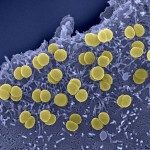Link to Pubmed [PMID] – 24392357
Link to DOI – 10.3389/fcimb.2013.00102
Front Cell Infect Microbiol 2013 ; 3(): 102
Transition metals such as iron, manganese, and zinc are essential micronutrients for bacteria. However, at high concentration, they can generate non-functional proteins or toxic compounds. Metal metabolism is therefore regulated to prevent shortage or overload, both of which can impair cell survival. In addition, equilibrium among these metals has to be tightly controlled to avoid molecular replacement in the active site of enzymes. Bacteria must actively maintain intracellular metal concentrations to meet physiological needs within the context of the local environment. When intracellular buffering capacity is reached, they rely primarily on membrane-localized exporters to maintain metal homeostasis. Recently, several groups have characterized new export systems and emphasized their importance in the virulence of several pathogens. This article discusses the role of export systems as general virulence determinants. Furthermore, it highlights the contribution of these exporters in pathogens emergence with emphasis on the human nasopharyngeal colonizer Neisseria meningitidis.

